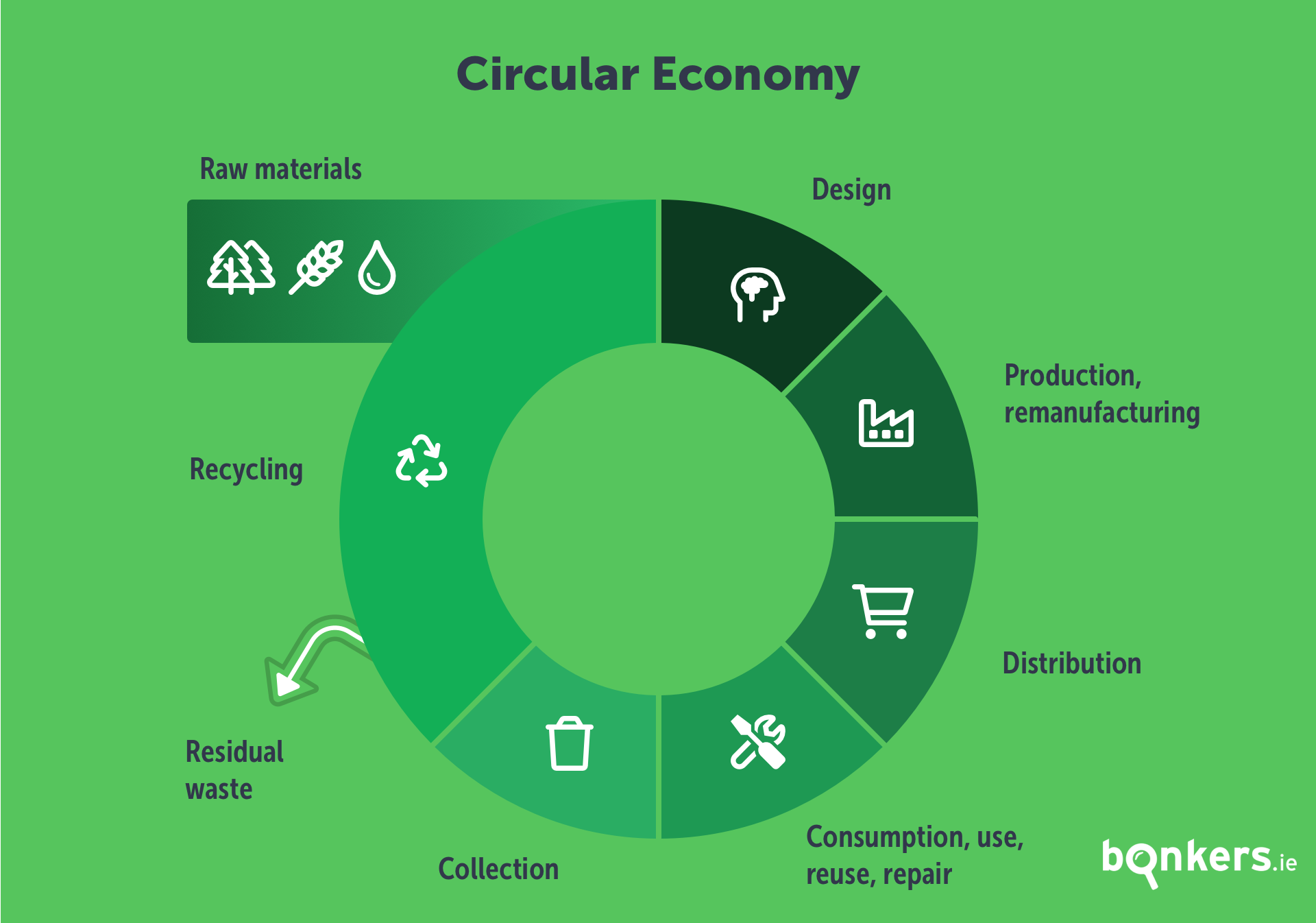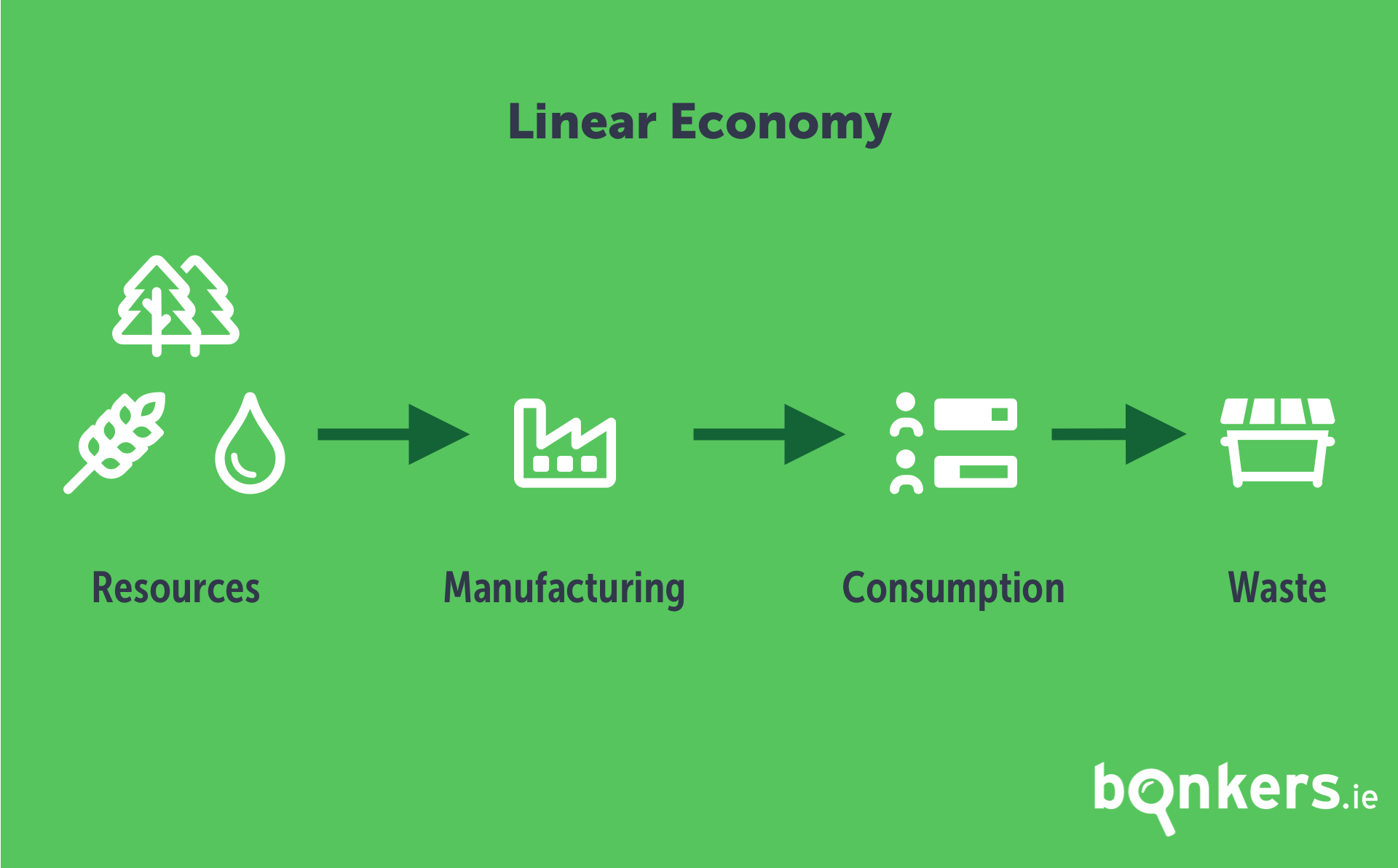.jpg)
Here we define what a circular economy is, and why transiting to a circular economy will help Ireland protect its environment and lower its greenhouse gas emissions.
According to the Circular Gap Record of 2021, 8.4% of the global economy is circular, meaning only 8.4% of our economy is creating products that can be re-used, recycled and re-circulated back into our markets.
However, if our planet wants to avoid the further breakdown of the environment and the climate, then the global circular economy needs to be roughly double the size of the current figure.
In this guide, you will discover how Ireland is planning to transition to a circular economy, the benefits this will bring and how you can play a part in this eco-friendly move.
What is the circular economy?

The circular economy is a model of production and consumption that aims to extend the life cycle of products and existing materials for as long as possible.
Unlike the traditional linear economic model, which is based on a take-make-consume-throw away pattern, the circular economy is built on eliminating waste and repairing, reusing and recycling products and their existing material.
For example, if you donate your clothes to a charity shop, you are participating in the circular economy as your old clothes are being re-circulated and re-used, rather than being dumped in a landfill.
By adopting this sustainable and circular system framework, we can minimise our waste which will help prevent the unnecessary extraction of raw materials and help the environment.
Why should you want to have a circular economy?
In Europe, only 12% of secondary materials and resources being used are brought back into the economy, meaning the remaining 88% are being dumped in landfills. This is unsustainable.
The world does not have an infinite supply of resources to be used and discarded nor enough landfills. As the global population grows along with the demand for products, the negative effects of the linear economic model are becoming more and more apparent.
Let’s take a look at the reasons why you should support a circular economy in Ireland, and around the world:
-
It will reduce greenhouse gas emissions
By 2050, Ireland along with the other EU member countries has committed to achieving climate neutrality, which means greenhouse gas emissions will be at a minimum.
This target was introduced to tackle climate change and stop its devastating effects on the environment. Currently, 45% of CO2 emissions come from the manufacturing and production of everyday materials, most of which are discarded after one use.
Therefore, if Ireland and Europe want to tackle climate change successfully, products must be designed and made in a more circular fashion as well as being less resource-heavy.
-
It will lower the pressure on natural resources
According to a study by the World Wildlife Fund, in the last 30 years, over a third of the earth’s natural resources have been destroyed.
By using raw materials in a more efficient way, such as reusing and recycling them from waste products, you are stopping the destruction of biodiversity and ensuring the security supply of raw materials.
As it stands, more than 90% of biodiversity loss and water stress comes from extracting and processing natural resources.
-
It will create longer-lasting, high-quality products
According to the Vice President of the European Green Deal, the linear economy produces products that ‘break down too easily, cannot be reused, repaired or recycled, or are made for single use only’.
In contrast, in a circular-based economy, longevity, durability and the re-use of materials and products are key principles kept in mind when products are designed and manufactured. Therefore, products will not break down as easily or need to be replaced as readily. -
It will create more jobs
In the EU Parliament's New Circular Economy Action Plan, it is stated that 700,000 jobs could be created by 2030 in Europe alone by adopting circular economy practices.
As product longevity is a key aspect of the circular economy, business opportunities in eco-design, product innovation, repairs and waste management could become more readily available for example
-
It will improve our economy
It is estimated that by boosting Ireland’s circularity we could save €2.3 billion annually.
If we eliminate wasteful practices and make better use of the resources we already have, then the cost of doing business in Ireland could be significantly reduced.
-
It will lower our reliance on global supply changes
In recent times, the COVID 19 pandemic, Brexit and the energy crisis has exposed the fragility of long global supply chains.
As a nation, we can no longer rely so heavily on these chains and must recognise the value of shorter and more localised supply chains in providing our needs.

How is Ireland fairing in relation to the circular economy?
According to Eurostat figures, in 2019 Ireland’s circular material use rate was the second worst in the EU!
While the EU average stood at 11.9%, Ireland’s rate sat at a measly 1.6%. In comparison, the best-performing EU member state, the Netherlands, achieved a rate of 28.5%.
Although Ireland’s rate is shockingly poor, in 2021 the Government stated it would support Ireland’s transition towards a circular economy in its Climate Action Plan.
This resulted in:
- Dublin being selected as the host city for the European Circular Economy Hotspot in 2023.
- The publication of the first Whole Government Circular Economy Strategy 2022-2023.
This strategy outlined a framework on how to achieve a circular economy here. Its key objectives included:
- To support and implement measures that will reduce Ireland’s circularity gap in absolute terms and in comparison to other EU member states.
- Raising awareness amongst households, businesses and individuals about the circular economy and how it can improve our lives.
- To support and promote increased investment in the circular economy in Ireland, with a view to delivering sustainable, regionally balanced economic growth and employment.
3. The Cabinet approving the Circular Economy Bill.
This bill aims to see:
- A range of single-use disposable products being phased out of production and use.
- Ireland become the first country in the world to eliminate the use of disposable coffee cups. Currently, 200 million cups are sent to our incinerators and landfills annually.
- The end of new coal exploration. New licences for the exploration and mining of coal, lignite and oil shale will no longer be issued.
- The prevention of illegal dumping and littering. Local Authorities will be empowered to use GDPR-compliant technologies such as CCTV to detect and discourage ‘fly-tipping’ or the dumping of waste illegally.
Current Government measures supporting the circular economy in Ireland
- The Plastic Bag Levy: Introduced in 2002, this levy sees retailers charge customers 22 cents for every plastic bag they purchase in-store. This levy aims to reduce the consumption of plastic bags in Ireland.
- The Landfill levy: Established in 2013, this Government levy requires you to pay €75 for every ton of commercial waste you dispose of in a landfill.
- The Deposit Return Scheme: The rollout of this scheme began in late 2022. It will allow consumers to receive up to 25 cent per can or plastic bottle they return to a shop or supermarket that has signed up for the program, which is run by non-profit organisation return.ie.
Different ways you can participate in the circular economy
Participating in a circular economy is not as hard as you might think. You might even be doing it in some capacity already.
So with that in mind, let’s take a look at various ways you can play your part in helping Ireland achieve a circular economy:
Purchase second-hand goods:
Not everything we need to own has to be brand spanking new. In fact, by purchasing second-hand products you can have a positive impact on the environment and save yourself some money at the same time.
- For clothes and shoes: Head to your local charity or vintage shops or check out sites such as Depop and eBay, where you can buy second-hand clothes from private sellers in just a few clicks.
Avoid fast-fashion retailers as much as possible as they tend to produce low-quality, disposable clothing. - For electrical items: Second-hand stores such as Refurbed.ie, repair and refurbish old electrical devices like mobiles and laptops back to their pre-owned condition.
- For furniture: Check out this list of stores and online forums where you can find refurbished, upcycled and donated furniture.
Buy high-quality goods:
Although buying cheap products may seem attractive in the short term, these products are not made to last. Instead, invest in higher quality goods that have a longer shelf life.
Buy sustainable products:
Tote bags, reusable coffee cups, water bottles, metal straws, and bamboo toothbrushes are all examples of sustainable products that you can use in your everyday life.
Recycle your waste properly:
Separate your waste into different segments such as food waste, recyclable materials, and general waste.
Find out if any of your local stores are participating in the Deposit Return Scheme so you can be paid for any cans or plastic bottles you recycle in that store.
Recycle your e-waste:
WEEE Ireland has set up dozens of electrical recycling centres across the country so you can dispose of your e-waste safely.
Check out 6 ways you can safely dispose of your e-waste here.
Take part in the sharing economy:
Instead of purchasing a bike or car unnecessarily, rent one with DublinBikes and/ or GoCar . These companies allow you to rent their bikes and cars on a short-term basis.
Exchanging baby clothes or toys at organised ‘swap groups’, or borrowing a book from the library, are other simple yet effective ways to engage in the sharing economy.
Stay environmentally conscious with bonkers.ie
To learn more about how Ireland is becoming more environmentally friendly, and what you can do to support this, check out our articles below:
- Read about Ireland’s climate targets and the importance of renewable energy.
- Have you considered investing in renewable energy? If so, take a look at our guide on solar panels and their positive impact on the environment.
- Understanding the new energy efficiency labels on appliances will help you make more eco-friendly decisions when purchasing products. Discover how to read these labels here.
Remember to keep up-to-date with all our environmentally-friendly news by reading our blog and guide pages.
Let us know
Do you have any questions about the circular economy? If so, tell us today, you can message us on Facebook, Twitter, and Instagram.


.png)

